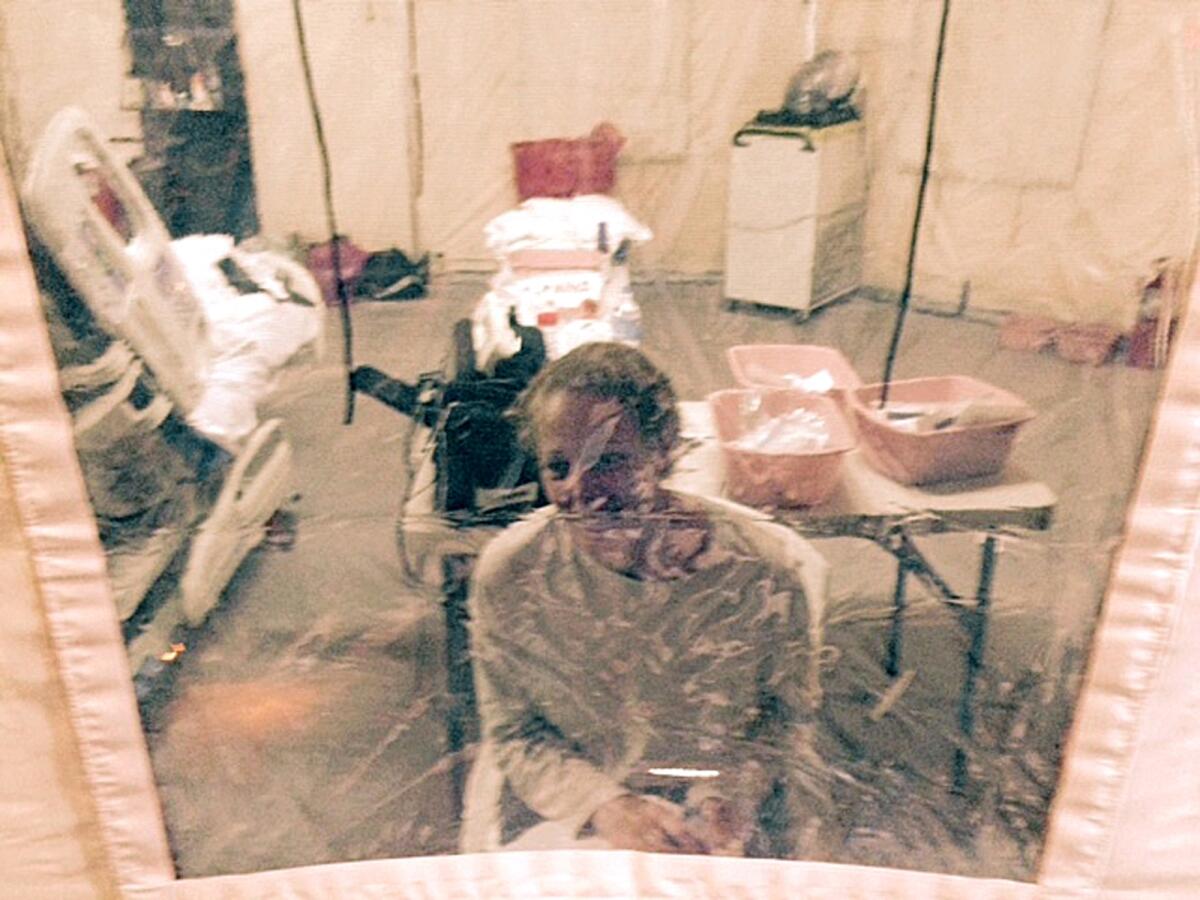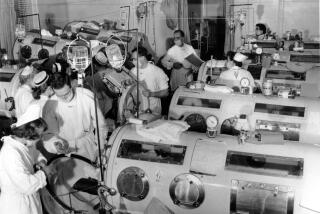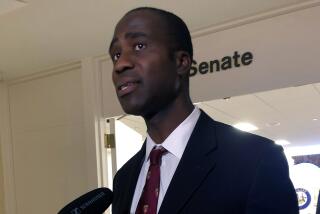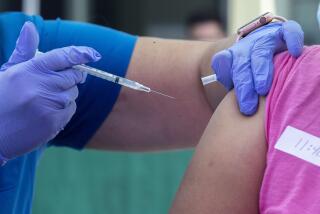Column: America’s epidemic of fear over Ebola

Beware of epidemics in election years.
It’s unfashionable to express sympathy for politicians these days, but spare an ounce of charity for all those officeholders trying to come up with reassuring responses to the terrifying — but so far, exaggerated — problem of Ebola in the United States.
The number of people who have died of the disease in the United States is exactly one, a case mishandled by an unprepared hospital in Dallas. Seven other Ebola patients have recovered, and one is still under observation.
But Americans are bad at all kinds of math, especially when it involves probability. And after the Texas hospital’s bungling resulted in one Ebola death and two more infections, people feared we were about to see a pandemic, and demanded action.
That left politicians with a dilemma. The scientists studying Ebola still didn’t see the disease as a crisis in the United States, and they offered complex explanations of why tightening restrictions on travel would backfire. But that didn’t satisfy a lot of ordinary Americans, who wanted their political leaders to protect them.
“Ebola is a hard problem,” explained Mark Mellman, a leading Democratic strategist who’s working on several Senate races. “People want to see political leaders doing something…. It’s very hard to explain the case for not quarantining people or imposing travel restrictions.”
That’s why we’ve seen so many politicians trying to demonstrate forcefully that they’ve got things in hand. Governors including Democrat Andrew Cuomo in New York and Republican Chris Christie in New Jersey swiftly imposed quarantines and other restrictions.
But rules developed hastily, in reaction to fear, don’t always turn out to be great rules. In New Jersey, returning nurse Kaci Hickox was one of the first to be caught up in the new restrictions. Confined to an unheated tent in a parking lot, she insisted she had been misdiagnosed, hired a lawyer and launched a media campaign.
Christie tried to bluster his way through, insisting that the nurse was suffering from a “high fever.” (She wasn’t.) But on Monday, the governor backed down and let her go home to Maine — insisting, of course, that he hadn’t backed down at all.
Christie “messed with the wrong redhead,” Hickox’s boyfriend said. Meanwhile, in New York, Cuomo relaxed some of the initial quarantine rules he had imposed.
At the moment, with no new Ebola cases for several days, it’s starting to seem possible that the federal government has finally gotten its act together and the governors will find a sensible — if not entirely happy — medium.
The Center for Disease Control and Prevention issued a straightforward recommendation on quarantines that classifies returning travelers on a scale from high risk to low risk, and establishes monitoring rules according to their classification. High-risk people — those who had direct contact with an Ebola patient’s body fluids — should avoid public contact for 21 days, be checked daily by a medical professional and be barred from commercial travel or public gatherings. Anyone with less exposure to the virus should be monitored too, but under far fewer restrictions.
“Don’t put everybody in the same bucket,” Dr. Anthony Fauci of the National Institutes of Health explained.
Sounds reasonable. But you have to wonder what took them so long. The rules would have made sense — and been more reassuring — if they had been issued weeks ago. And they might have prevented politicians from feeling they had to step so far into medical territory.
But there’s one bit of good news: The public’s fears may soon start to ebb because Ebola is starting to look less terrifying when patients get good medical care in U.S. hospitals.
The death rate from the disease in West Africa has been estimated at a terrifying 70% or higher. But that’s in a part of Africa where medical care often comes late or not at all.
In the United States, the only patient to die so far was Thomas Eric Duncan, who didn’t receive treatment initially when he reported symptoms of the disease. Several of the American patients who have recovered were given experimental drugs, but not all — and doctors say they don’t know whether the drugs made a difference. Some, including Dallas nurse Amber Vinson, recovered largely on their own, with only supportive care — hospital monitoring to maintain their bodies’ fluids and electrolytic balances.
The CDC treatment guidelines are spare. “No FDA-approved vaccine or medicine … is available,” the center says. “Recovery from Ebola depends on good supportive care and the patient’s immune response.”
It’s likely there will be more Ebola cases in the United States. But it’s possible that the epidemic of fear is starting to ebb, and that will make dealing with the disease itself a lot easier — for politicians and medical personnel alike.
Twitter: @doylemcmanus
More to Read
A cure for the common opinion
Get thought-provoking perspectives with our weekly newsletter.
You may occasionally receive promotional content from the Los Angeles Times.







